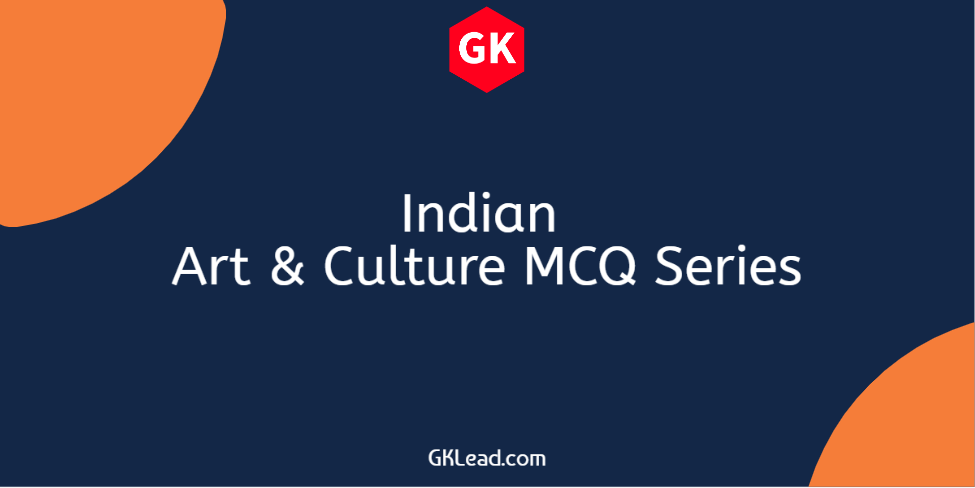Indian Art & Culture MCQ Set-6
Maurya Empire Art and Culture MCQ for competitive examinations in India such as UPSC, SSC CGL, SSC CHSL, NDA, State PSC, Police recruitment and various government job recruitment examination by the Government of India, PSUs and the state Governments in India.
Q.1 Which of the following is the oldest surviving rock-cut caves in India?
A. Barabar Cave
B. Ajanta Cave
C. Ellora Cave
D. Badami Cave
Answer: A. Barabar Cave
Note: The Barabar Hill Caves are the oldest surviving rock-cut caves in India, dating from the Maurya Empire (322–185 BCE), some with Ashokan inscriptions, located in the Makhdumpur region of Jehanabad district, Bihar, India, 24 km north of Gaya,Bihar.
Q.2 The pillars of Ashoka were made of:
A. Sandstone
B. Copper
C. Iron
D. Gold
Answer: A. Santstone
Note: The pillars of Ashoka were carved in two types of stone. Some were of the spotted red and white sandstone and most of them exhibiting the characteristic Mauryan polish.
Q.3 The Lion Capital of Ashoka, currently its graphical representation is the official emblem of India was placed on the top of the Ashoka Pillar located in which of the following place?
A. Sarnath
B. Vaishali
C. Sanchi
D. Meerut
Answer: A. Sarnath
Note: The Lion Capital of Ashoka is a sculpture of four Asiatic lions standing back to back, on an elaborate base that includes other animals. A graphic representation of it was adopted as the official Emblem of India in 1950. It was originally placed on the top of the Ashoka pillar at the important Buddhist site of Sarnath by the Emperor Ashoka, in about 250 BCE during his rule over the Maurya Empire.
Q.4 Didarganj Yakshi, one of the finest examples of ancient Indian stone statue was found in which of the following place?
A. Vaishali
B. Patna
C. Meerut
D. Indore
Answer: B. Patna
Note: Didarganj Yakshi, is dated back to 1st century BCE and it has Mauryan Polish over it. It was found in 1917 near Patna.
Q.5 Which among the following is CORRECT about the coins of Maurya Empire?
I. Coins issued by Maurya empire were mostly made of silver
II. The coinage of Maurya empire were punch-marked coinage
III. The most common symbol of the coins are elephant
A. Only I
B. Only II
C. Both II & III
D. I, II and III
Answer: D. I, II and III
Q.6 Which of the following is CORRECT about Ringstone?
I. It is a distinctive type of doughnut shaped artefact and miniature sculpture
II. It was approximately made during the period of Maurya Empire followed by Shunga empire
III. The largest collection of ringstone is in the Patna Museum
A. Only I
B. Only II
C. Only III
D. I, II & III
Answer: D. I, II & III
Q.7 Chandragupta Maurya joined wandering group of monks of which of the following religion after renouncing the throne?
A. Buddhism
B. Jainism
C. Hinduism
D. None of these
Answer: B. Jainism
Q.8 Ashoka followed Buddhism after which of the following war?
A. Kalinga War
B. Magadha War
C. Taxila War
D. None of these
Answer: A. Kalinga War
Note: Ashoka followed Buddhism; following the Kalinga War, he renounced expansionism and aggression.
Q.9 With which of the following centre of learning, Chanakya was associated?
A. Taxila
B. Nalanda
C. Vaishali
D. Vikramshila
Answer: A. Taxila
Q.10 Which of the following mentioned that during the Mauryan Empire, Indian society was divided into seven classes?
A. Indica
B. Arthasastra
C. Ashoka’s edicts
D. None of these
Answer: A. Indica
Note: India was written by Megasthenes, the Greek ambassador to India around 300 BCE. As per Indica, the Indians generally were divided into seven categories, the wise men (Brahmins), farmers, herdsmen, artisans, soldiers, over lookers and government officials including army and navy officers.
List of Indian Art & Culture MCQ sets from GKLead.com
- Indian Art & Culture MCQ Set-1
- Indian Art & Culture MCQ Set-2
- Indian Art & Culture MCQ Set-3
- Indian Art & Culture MCQ Set-4
- Maurya Empire Art and Culture MCQ Set-5
- Indian Art & Culture MCQ Set-6
- Indian Art & Culture MCQ Set-7
- Indian Art & Culture MCQ Set-8
- Indian Art & Culture MCQ Set-9
- Indian Art & Culture MCQ Set-10
- Indian Art & Culture MCQ Set-11
- Indian Art & Culture MCQ Set-12
- Indian Art & Culture MCQ Set-13
- Indian Art & Culture MCQ Set-14
- Indian Art & Culture MCQ Set-15
- Indian Art & Culture MCQ Set-16
- Indian Art & Culture MCQ Set-17
- Indian Art & Culture MCQ Set-18
- Indian Art & Culture MCQ Set-19
- Indian Art & Culture MCQ Set-20

